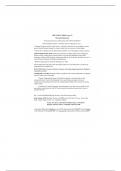MED SURG CARDIAC (part 2)
Myocardial Infarction
Permanent destruction of Myocardial cells- MOVE QUICKLY!
Ischemia begins (angina) – 20-30min necrosis will begin to occur. .
*Complete Occlusion of the coronary artery - Caused by blood clot, pieces of plaque, coronary
spasm (Variant/Prizmetal Angina), or Anemia where there is a decrease in blood supply
*Usually due to damage done by atherosclerotic buildup / or traveling plaque causing occlusion
Clinical Manifestations of MI: chest pain (sub-sternal, crushing, sudden onset), Indigestion,
Nausea, Anxiety, restless (due to hypoxic brain), cool, pale skin, diaphoresis, tachycardia,
tachypnea, dyspnea, SOB, dizziness, radiating pain that can be felt in back, shoulder, arm, jaw, or
neck. (Women sometimes feel different manifestations)
>20min of Angina and no relief from Nitroglycerin = MI!!
Ask the Patient about the pain: when did it begin? What were you doing? Have you taken any
medication? Does it radiate? Etc.
OLD CARTS (Onset, Location, Duration, Character, Alleviating/Aggravating factors, Radiation,
Treatments, Severity)
Complications of an MI: Pulmonary Edema, Arrythmia, CHF, Cardiac Tamponade, Cardiogenic
Shock, Cardiac Arrest, Pericarditis
*Cardiac Tamponade develops when fluid accumulates in the pericardial sac that
surrounds the heart. Can be life threatening* if too much fluid accumulates; will cause
compression and squeezing of the heart, preventing adequate filling of the ventricles, reducing
cardiac output.
Treatment for Cardiac Tamponade: pericardiocentesis: provider inserts a needle into the
pericardial sac and drains the fluid. ECG used to guide the needle and ensure that it does not
puncture the heart.
MI – can Be NSTEMI/STEMI (ST elevated / Non-ST Elevated on EKG)
Interventions of MI: Bed Rest, Position with HOB elevated 30 deg. IV Access, Assess Labs
(CBC, Cardiac Markers, BUN, Cr, Coagulation Studies)
Norms: PT: 10-12 | aPTT 20-39 | INR less than 1 | PTT 60-70
Heparin *Measure aPTT ; Coumadin *Measures INR
Administer Medications (Morphine to lower SNS response; decreases HR&BP) Provide Oxygen
(2-4L) Maintain O2 Sat greater than 95%, Nitroglycerin Administration (Q5min; did the patient
, take it yet? Have they taken Viagra?) Administer 4 Baby Aspirins (anti-platelet) and advise
patient to chew it for fast absorption (Do they have history of GI bleed??) Beta Blockers given to
lower BP, vasodilation, and slows the heart ---NOT IN THAT ORDER!
Thrombolytics and Heparin begin within 30minutes of MI for Cardiac re-perfusion – if these
interventions fail: Cath Lab for Catherization, Stent, CABG, or PCI..
**REMEMBER clot Busters and Heparin must be given on 2 separate IV Lines!
Surgical Interventions of MI:
PTCA; Percutaneous Transluminal Coronary Angioplasty: balloon-tipped catheter used to open
vessel and resolve ischemia. NON-surgical, invasive procedure that is performed to open up the
occlusion. Catheter tip inserted within femoral artery, RISK of blood loss following the
procedure. A sand bag or closure device is placed on the site of entry to provide direct pressure
and to allow the blood to clot and prevent bleed.
Coronary Artery Stent: metal mesh used to provide support to vessel at risk for closure
CABG: uses another vein to bypass coronary artery block altogether, usually the saphenous vein
in leg
-Post Op CABG:
Monitor BP; hypertension can be a bleed at the site / hypotension can cause a
collapse of the graft.
Monitor temp; Hypothermia is a complication of CABG; re-warming procedures
used if needed
Monitor for bleeding
Chest tube care, LOC, Cardiac Rhythm, Pain Level
Diagnostic Testing: Cardiac Enzymes (CKMB and Troponin) when Myocardial Cell death
occurs, they are released into the blood stream and elevation occurs on these labs:
CKMB shows elevation 2-3 Days
Troponin most specific*to heart elevated for 1-2 weeks
Altered Peripheral Perfusion:
Arteries have higher pressure* more blood volume. They carry Oxygenated Blood away
from the heart to the body
Veins have more stretching ability than arteries- they hold 75% of blood volume and
carry De-oxygenated blood. They contain valves that prevent blood from back-flowing and work
against gravity to get the de-oxygenated blood back to the heart.




